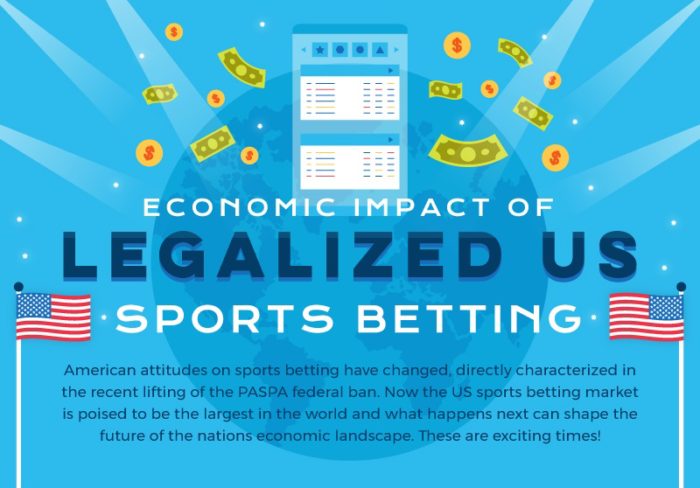A few years ago, on May 14, 2018, the Supreme Court decided to back New Jersey’s bid, allowing any state in the US to legalize sports betting. The Supreme Court overthrew PASPA – Professional and Amateur Sports Protection Act of 1992 – a law that was supposed to define the legal status of sports betting throughout the States.
However, PASPA didn’t ban sports gambling, it just didn’t permit the states to allow it. Passing the law ultimately resulted in creating an underground virtual monopoly over a multi-billion dollar industry.
Strong Case Against PASPA
The infographic below points out some facts regarding the illegal cash flow in the betting industry before the overturn of PASPA. As it turns out, the government of the state of New Jersey presented a strong case against PASPA, and it seems that participants of the hearings were worried that the law would restrain the States’ rights to raise revenue.
The American Gaming Association estimated that American citizens illegally wager more than $150 billion each year on sports betting. Until PASPA was struck down, Nevada was one of the only four states that permitted sports betting (Delaware, Oregon, and Montana also had an immunity). However, Nevada’s legally wagered money covered up for only a small portion of the total sum wagered on betting activities throughout the States (less than 4%).
Before PASPA was abolished, the Congress had the rights to mandate the forms that intrastate commerce states may regulate. However, by doing so, they didn’t manage to eliminate the sports betting market. They’ve just driven it underground.
New Beginnings Will Bring New Changes
On July 31st, 2018 ,Adam Silver, commissioner of the NBA, has teamed up with MGM, creating the first partnership between a major sports organization in the US and a gambling operator. The goal of this historic partnership is to preserve the integrity of the game and spread the global presence of the NBA.
MGM’s partnership with the NBA is only the next logical step in the development of this potentially booming industry. The process of accepting betting as a part of sports culture in the United States has begun.
The Cash Flow in Gambling is Tremendous
According to Oxford Economics, there is a lot going on under the table. Apparently, the numbers from the report project that the legalization of sports betting could increase the US annual GDP up to $40 billion.
Also, legalizing sports can help the US economy to keep the money within the States and help prevent domestic casinos to go bankrupt. Moreover, the newly-formed legal gambling system could create employment opportunities for more than 125,000 people.
When all of this is said and done, a typical worker in a reformed sports betting industry would have an average salary of approximately $48,000. In fact, this is only the beginning of economic benefits coming from legalized gambling in the US. Advances and technological innovations in online betting services will also have a strong impact on the economy.
A Bond Between Technology and Gambling
The United Kingdom has been the world’s leading online sports gambling market for many years now. UK mobile industry currently covers around 60% of the country’s sports betting market. The UK gambling market should serve as a blueprint for the future of sports betting in the US because mobile betting via smartphone apps would bring billions of dollars worth of revenue.
It is a known fact that technological developments make sports gambling far more entertaining. It’s much easier to place a bet for NBA Primetime Saturday game from your favorite recliner than having to drive to the casino at last minute.
It is only a matter of time before the mobile betting market in the US becomes the world’s largest. This somewhat bold statement doesn’t come as a shock if we take into consideration the potential influence of US powerhouse economy on the expansion of mobile betting industry.
To sum it all up, legalized sports betting in the US is a huge win for the US tax revenue, employment, and the entertainment business. Take a look at the nifty infographic below courtesy of our friends at NJ Games. For the Silo, Onur Unlu.

